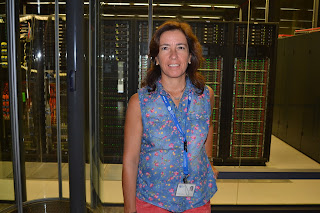 |
| StarSs is a task-based programming model by Barcelona Supercomputing Center that has the potential to change the way applications are developed (click on image to enlarge). |
When considering complex systems with aspects such as large scale, distribution, heterogeneity, variability, etc. it is indeed more important to offer programming paradigms that simplify the life of the programmers while still providing competitive performance results.
StarSs (Star superscalar) is a task-based family of programming models that is based on the idea of writing sequential code which is executed in parallel at run-time taking into account the data dependencies between tasks.
Speaker background:
 |
| Dr. Badia in the MareNostrum supercomputer site (BSC, Spain). |
Her current research interest are programming models for complex platforms (from multicore, GPUs to Grid/Cloud). The group led by Dr. Badia has been developing StarSs programming model for more than 10 years, with a high success in adoption by application developers. Currently the group focuses its efforts in two instances of StarSs: OmpSs for heterogeneous platforms and COMPSs/PyCOMPSs for distributed computing including Cloud.
For this last case, the group has been doing efforts on interoperability through standards, for example using OCCI to enable COMPSs to interact with several Cloud providers at a time. Dr Badia has published more than 150 papers in international conferences and journals in the topics of her research. She has participated in several European projects, for example BEinGRID, Brein, CoreGRID, OGF-Europe, SIENA, TEXT and VENUS-C, and currently she is participating in the project Severo Ochoa (at Spanish level), ASCETIC, Euroserver, The Human Brain Project, EU-Brazil CloudConnect, and trasnPLANT and it is a member of HiPEAC2 NoE.
This is the second episode in a series providing you with details behind the SC15 Invited Talks Program.

1 comment:
This would almost bring about more of the good instances as we have seen in the past the certain probabilities almost bringing more of the positive aspects. management homework help
Post a Comment